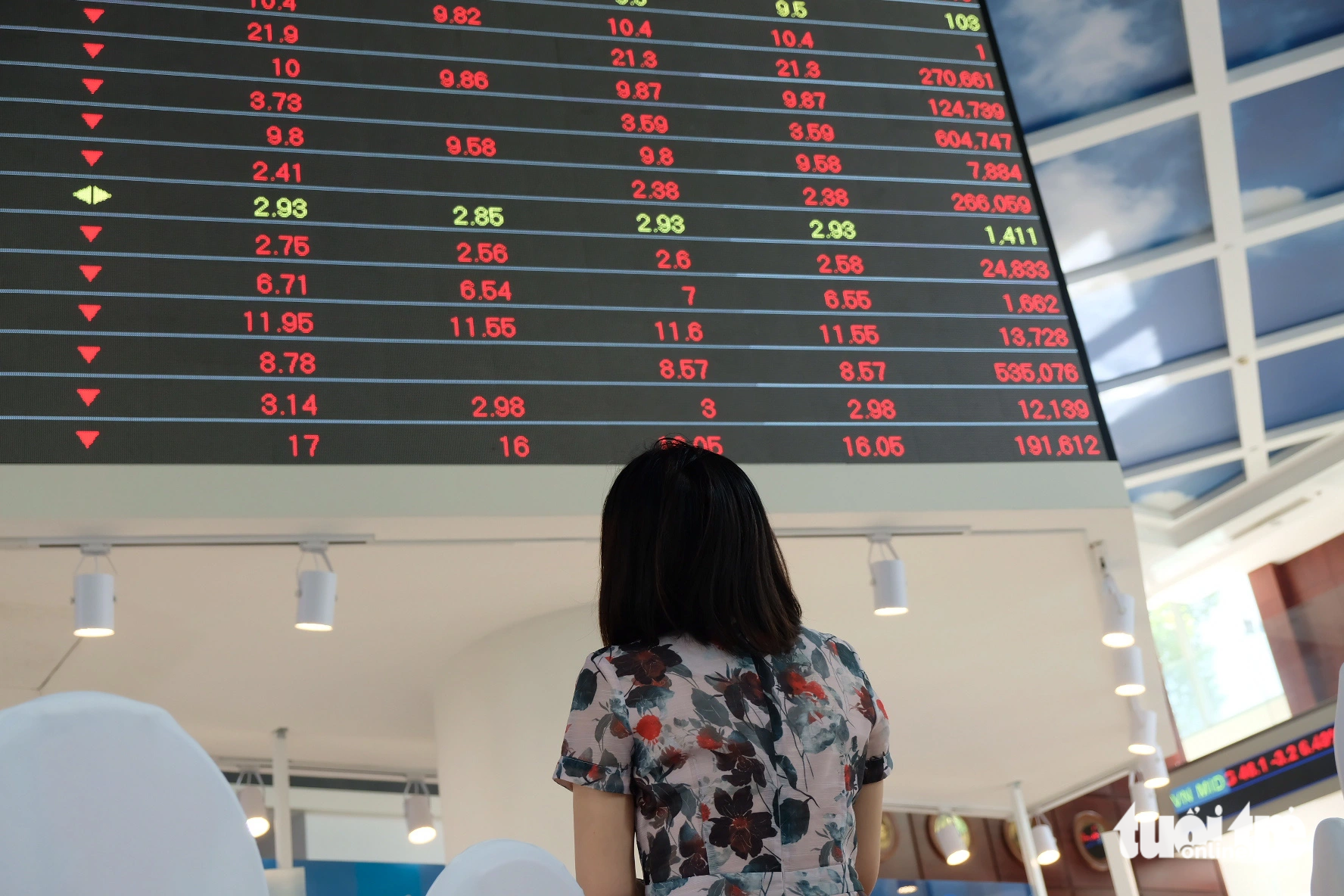Investors could not help but "sweat" when witnessing the stock market plummeting in today's session, October 18, with the VN-Index at one point falling as much as 33 points.

The stock market is constantly being adjusted down, causing many investors to worry and suffer losses.
Although the stock market opened in green at the start of today's trading session, it immediately fell into red and remained stagnant for a long time.
However, near the end of the session, selling pressure became more intense, the VN-Index at times dropped up to 33 points, then the sellers and buyers continued to struggle strongly.
Real estate stocks became the focus of investors' panic selling, with a series of "big names" falling in price such as NVL (Novaland), PDR (Phat Dat), VIC (Vingroup), VHM (Vinhomes), DXG (Dat Xanh)...
Many other codes in this industry fell to the floor price, typically HTN (Hung Thinh Incons), CKG (Kien Giang Construction), DIG (DIC Corp), HQC (Hoang Quan Real Estate)...
The market is under more pressure as it has to witness many large-cap stocks in other industries such as BID (BIDV), GAS (PetroVietnam Gas), HPG (Hoa Phat), MSN (Masan), MWG (Mobile World)… losing points.
On the opposite side, some stocks still held on in green, contributing to curbing the market's decline, including VJC (Vietjet), PVD (PVDrilling), VIX (VIX Securities), DCG (Duc Giang Chemicals), STG (Southern Logistics)...
Except for telecommunications and tourism-entertainment, the indexes of all other sectors fell into negative territory. Sectors that recorded declines of 2% or more included real estate, retail services, media and resources.
Closing the fiery trading session, the VN-Index officially decreased by more than 18 points (-1.6%) to the 1,103 point area. Red also covered both the HNX and UPCoM floors, recording a decrease of more than 2.9 points (-1.3%) to 227 points, and 0.7 points (-0.8%) to the 85.9 point area, respectively.
The total value of stock trading during the day increased by 55% compared to the previous session, reaching approximately VND 25,300 billion.
Notably, foreign investors continued to net buy up to more than 580 billion VND in today's session, bringing the total net buying value in two consecutive sessions to more than 690 billion VND.
The analysis team of Vietcombank Securities (VCBS) said that VN-Index formed a red base below the old bottom area. Indicators on both daily and hourly charts are pointing down negatively, indicating that selling pressure may still continue.
If selling pressure continues to increase, the VN-Index may fall to the 1,085 or 1,070 point area. In a more positive scenario, the index will develop in a flat wave pattern and today's decline will be considered a SOW session (oversold session, falling below support).
"Investors should not abuse leverage, patiently observe market developments in the coming sessions and limit early bottom-fishing disbursements at this time, while adhering to investment discipline and reducing the proportion of stocks that have fallen below the support zone after a series of three recent declines," VCBS said.
Mr. Nguyen The Minh - director of strategic analysis of Yuanta Securities - said there are many reasons to explain why stocks have been continuously fluctuating and decreasing recently.
First of all, the yield on the 10-year US Treasury bond has risen to 4.8%, returning to its 2007 high. Not to mention, the USD is also anchored at a high level. These are indicators that the economy is likely to decline and experience a crisis in the future.
Many stock experts also said that in the domestic market, many investors use loans from "outside warehouses", with high leverage ratios such as 2:8 (2 dong of capital, 8 dong of loan) or 1:9 (1 dong of capital, 9 dong of loan) to buy stocks, especially speculative groups. When the market plummets, "outside warehouses" will simultaneously activate sell orders, causing investors to suffer heavier losses.
Currently, many investors are waiting for the third quarter 2023 business results of enterprises to have more basis for making decisions on buying and selling stocks.
According to Tuoi Tre